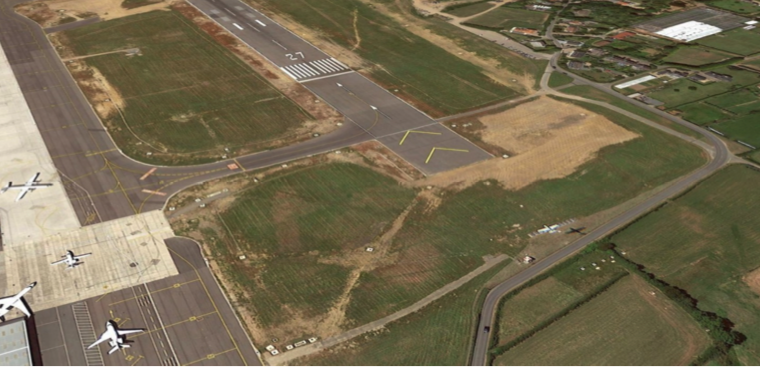


With the election imminent and the availability of the Frontier Economics Cost Benefit Analysis Report, a group of islanders with significant experience in aviation and business have set out the 'facts' concerning a possible runway extension.
"The Guernsey runway is too short to accept industry standard short haul jets on an economic basis, such as those that regularly service Jersey. In fact our runway is the shortest in the UK, for any major commercial airport and probably the only independent island jurisdiction in the world that cannot not take industry standard jets.
Apart from Aurigny and Blue Islands/Loganair, there are now very few UK airlines that have aeroplanes that could operate off our short runway and provide our vital air links to the UK.
Basic economics dictates that larger airlines with larger aeroplanes can avail them themselves of the economies of scale and offer low fares. Jersey is the perfect example of this in action, with fares 39% lower than those in Guernsey [Frontier Report page 68]. Furthermore, in contrast to Jersey, Guernsey is constrained in taking advantage of the huge growth in corporate and charter jet traffic, as many need a longer runway, when taking off for long haul flights.
There is no doubt that post Covid, airlines will be keen to invest in industry standard new generation jet aeroplanes, which will be up to 20% more efficient, but will need a 1700m -1740m runway to operate from. Not only will these larger aeroplanes burn less fuel, but due to their capacity, they will emit less CO2 per passenger, thus adding to their Green credentials.
It is a fallacy that Jersey is able to support the operation of larger aeroplanes just because of that island’s larger population. Actually, it is the availability of low fares that is the controlling factor that creates the demand for people to travel and a very large majority of passengers travelling to Jersey, are non residents.
It is the availability of these low fares and the demand that it creates for people to travel to Jersey, that enables Jersey residents to benefit from superior air links with frequency, low fares and an extensive route network. There is no reason at all that this would not be replicated here in Guernsey, with a runway length similar to that in Jersey. In short, it is not just a function of the resident population, much more the availability of low fares because of their longer runway, that is the reason for Jersey’s superior air links.
Pre Covid, Guernsey’s tourist infrastructure was suffering from falling numbers arriving at the airport from the UK. In fact, against worldwide trends, the passenger numbers through Guernsey airport were actually falling on an annual basis from 2011. This explains why hotels remain empty and bed stock is declining. But once the tourist industry can see a positive future with an increase in people arriving in Guernsey, this will be the trigger for businesses to invest in the industry. Until then, it would simply not be viable.
This increase will only happen with the advent of low fares, which in turn will only result from larger aeroplanes operating here on a longer runway, unless the taxpayer provides massive subsidies to existing carriers. Again, with low fares will come the increased demand to travel here and hotels will expand and develop to accommodate them. We have an abundance of historical and natural attractions here in the Bailiwick, to make people want to come here for a holiday and developing the tourist economy will be a vital part of our recovery and future sustainability. All we need is low fares to attract them here.
As part of the post Covid recovery, it is vital that long overdue investment is made in our infrastructure, but this investment must realise a return to the Guernsey taxpayer. Late last year, the Frontier Economics Report was commissioned by the States to look at a Cost Benefit Analysis of extending the Guernsey Runway. The recommendations were published just prior to the Covid crisis and they are unequivocal and unambiguous in stating that the benefits to our future economy far outweigh the environmental and capital costs [Frontier Report page 64].
Therefore this infrastructure project will indeed provide a return on the taxpayers’ investment, which in turn will help with the long term recovery of our economy, in accordance with the Revive and Thrive Policy.
The Frontier Economics Report is looking way into the future when hopefully the negative effects of Covid on the demand for travel will be just a distant memory and our essential travel links to and from the UK will be normalised. By that time there should be a significant increase in people wishing to travel to Guernsey for tourism and commerce. Bearing in mind that it will take several years before a runway extension would be operational, a further delay in making a decision would be just more unnecessary shortsighted prevarication. Therefore the Frontier recommendations post Covid, should still be valid, as extra passengers will be generated, even if the base normal is lower in the short term.
The question has to be asked - why would the States of Guernsey commission yet another professional Report and then continue to ignore the advice given?"
The Full Frontier Economics Report can be found on the gov.gg website: https://www.gov.gg/CHttpHandler.ashx?id=129464&p=0
The Letter has been signed by Jerry Girard, Tim Robins, Barry Cash, Rob le Page, Harvey Marshall, Dr John Ferguson and Peter Bachmann.
Comments
Comments on this story express the views of the commentator only, not Bailiwick Publishing. We are unable to guarantee the accuracy of any of those comments.